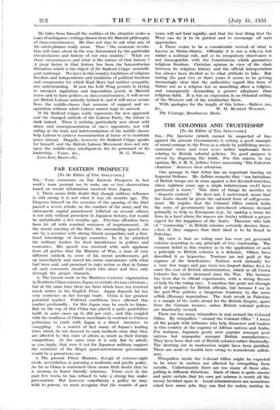FAR EASTERN PROSPECTS
[To the Editor of THE SPECTATOR.]
Sin,—Your comments on Far Eastern Prospects in last week's issue prompt me to make one or two observations based on recent information received from Japan.
1. There seems little doubt that though military influence is still strong it is not what it was six -months ago. The Emperor himself on the occasion of the opening of the Diet passed a severe rebuke on the conduct of the army, and the subsequent capital punishment inflicted on several officers is not only without precedent in Japanese history, but would be unthinkable a few months ago. Previous offenders have been let off with nominal sentences of imprisonment. At the recent meeting of the Diet, the outstanding speech was one by a member with strong liberal sympathies and a first- hand knowledge of foreign countries. In it he attacked the military leaders for their interference in politics and economics. His speech was received with such applause from all parties that the Minister of War, a man of very different outlook to some of his recent predecessors, got up immediately and stated his entire concurrence with what had been said, and promised to take action so that in future all such comments should reach him alone and then only through the proper channels.
2. The breach made in the Maritime Customs' organisation in Northern China exposes Japan to certain obvious criticisms ; but at the same time there are facts which have not received much notice in the English Press. Japan depends for her very existence on her foreign trade. China is her greatest potential market. Political conditions have affected this market profoundly ; for this Japan may be much to blame. But on the top of this China has placed a quite prohibitive tariff, in some cases up to 200 per cent., and this coupled with the readiness of Chinese merchants in contrast to Chinese politicians to trade with Japan is a' direct incentive to smuggling. As a matter of fact many of Japan's leading firms which do not descend to such methods state that they are affected by this state of affairs as much as their foreign competitors. At the same time it is only fair to admit, as you imply, that were it not for Japanese military support the existence of the Hopei quasi-autonomous government would be a precarious one.
3. The present Prime Minister, though of extreme-right stock, nevertheless is pursuing a moderate and pacific policy. As far as China is concerned there seems little doubt that he is anxious to foster friendly relations. Twice over in the past few weeks he has refused to take a strong line -under provocation. But however conciliatory a policy he may wish to pursue, we must recognise that the wounds of past years will.noV-Inial.rapidly, and that the best thing that the West can do is' to be patient- and to encourage all such approaches. -
4. There smirks to be a 'considerable revival -of what is known 'as Shrine-Shinto. *Officially • it is not. It relkhn but rather a national cult, and so its compulsory observance is not incompatible 'with the Constitution which guarantees religious freedom. Christian opinion in view of the clash between its religious history and the official interpretation has always been divided as to what attitude to take. But during the past two or three years it seems to be -getting increasingly clear that the authorities regard this form of Shinto not as a religion but as something above a religion, and consequently demanding a greater allegiance than religious faith. It is but an expression in an Oriental setting of the Western cult of the totalitarian State.
With apologies for the length of this letter.—Believe me,






































 Previous page
Previous page